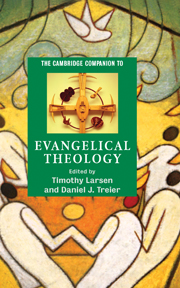1 - Defining and locating evangelicalism
Published online by Cambridge University Press: 28 September 2007
Summary
An evangelical is:
an orthodox Protestant
who stands in the tradition of the global Christian networks arising from the eighteenth-century revival movements associated with John Wesley and George Whitefield;
who has a preeminent place for the Bible in her or his Christian life as the divinely inspired, final authority in matters of faith and practice;
who stresses reconciliation with God through the atoning work of Jesus Christ on the cross;
and who stresses the work of the Holy Spirit in the life of an individual to bring about conversion and an ongoing life of fellowship with God and service to God and others, including the duty of all believers to participate in the task of proclaiming the gospel to all people.
This definition has been specifically devised for this volume. As I have tried it out on colleagues, they have jokingly referred to it as “the Larsen Pentagon,” which is a compliment to the standard definition of evangelicalism, the Bebbington Quadrilateral. The British historian, David Bebbington, in his seminal study, Evangelicalism in Modern Britain: A History from the 1730s to the 1980s (1989), defined evangelicalism by identifying its four distinguishing marks: conversionism, activism, biblicism, and crucicentrism - that is, evangelicals emphasize conversion experiences; an active laity sharing the gospel and engaged in good works; the Bible; and salvation through the work of Christ on the cross. Bebbington's definition is routinely employed to identify evangelicalism; no other definition comes close to rivaling its level of general acceptance. It is the definition used by numerous scholars who have studied aspects of evangelicalism.
- Type
- Chapter
- Information
- The Cambridge Companion to Evangelical Theology , pp. 1 - 14Publisher: Cambridge University PressPrint publication year: 2007
- 12
- Cited by



